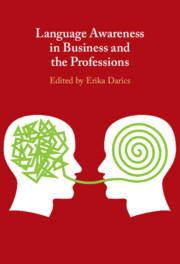Book contents
- Language Awareness in Business and the Professions
- Language Awareness in Business and the Professions
- Copyright page
- Contents
- Figures
- Tables
- Contributors
- Foreword
- Part I Introduction
- 1 Language Awareness and Discourse Consciousness in Contemporary Life and Work
- Part II Language Awareness in Business and the Professions
- Part III Language Awareness in Education and Training
- Index
- References
1 - Language Awareness and Discourse Consciousness in Contemporary Life and Work
from Part I - Introduction
Published online by Cambridge University Press: 28 July 2022
- Language Awareness in Business and the Professions
- Language Awareness in Business and the Professions
- Copyright page
- Contents
- Figures
- Tables
- Contributors
- Foreword
- Part I Introduction
- 1 Language Awareness and Discourse Consciousness in Contemporary Life and Work
- Part II Language Awareness in Business and the Professions
- Part III Language Awareness in Education and Training
- Index
- References
Summary
The crucial role language plays in constituting our reality, and in achieving political influence and control, has long been known in scholarship: organizational disciplines have been ‘linguistically turned’ since the 1970s. However, the appreciation of the role of language in understanding organisational realities and power relations have not been fully translated to education or even to research beyond linguistically focussed academic strands. This chapter sets out to (re)define language awareness and discourse consciousness as key skills in business and professional life. It makes a case for the introduction of a socially conscious approach to language and argues that such knowledge will empower future generations of professionals to question the taken-for-granted, especially when it concerns power, and enable them to develop a self-reflexive, critical and hopefully more ethical practice. The chapter explores in greater detail the various functions that language and communication entail. It shows how the understanding of these functions translate to different types of awareness, and how such awareness leads to higher level and ethical thinking. It discusses the problems related to language awareness, and proposes potential ways of raising such awareness, concluding with a brief overview of each chapter and making a case for a paradigmatic change in thinking about language awareness as a key soft skill.
- Type
- Chapter
- Information
- Language Awareness in Business and the Professions , pp. 3 - 18Publisher: Cambridge University PressPrint publication year: 2022

